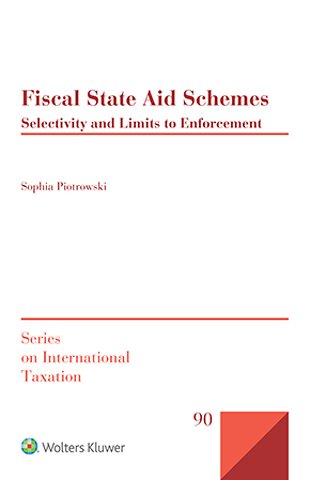Fiscal State Aid Schemes
Selectivity and Limits to Enforcement
Samenvatting
Fiscal State Aid Schemes is an exhaustive study that explains in detail the architecture of EU State aid law as applied to fiscal aid schemes and elucidates the legal consequences of infringements in the context of State aid.
Centering on the criterion of selective advantage under Article 107(1) TFEU and on the limits to recovery in the enforcement of State aid law, the author explores the current state of play after nearly 25 years of an ever more significant role of fiscal State aid law, emphasizing its ongoing uncertainties and potential modifications. The analysis relies on a case law approach that reveals how the objectives of State aid control are limited both by Member States’ fiscal sovereignty and by taxpayer rights. Issues and topics include the following:
- the role of the general principles of EU law as case-by-case limits to State aid enforcement;
- how the application of the selectivity test depends on the design of the tax measure in question;
- particularities of different types of taxes under State aid law;
- the role of the principle of protection of legitimate expectation in State aid law; and
- the structural problem that taxpayers are not in a position to notify aid to the Commission.
The author confronts the allegedly overly broad reading of material State aid law and the supposedly unjust consequences of infringements of State aid law, offering deeply informed recommendations and an outlook for future developments.
This comprehensive and well-structured exposition provides a deep understanding of the status quo of EU State aid law as applied to Member States’ tax measures. With comprehensive detail on the highly controversial legal consequence of recovery, it places the debate on fiscal State aid law in a broad context, exploring a wide range of taxes and tax measures and identifying an analytical framework underlying the case law of the CJEU. Professionals concerned with taxation in Europe – whether legal practitioners, jurists, policymakers, or academics – will have everything they need to understand the current dynamics.
Specificaties
Inhoudsopgave
Preface
Acknowledgements
CHAPTER 1
Introduction
PART I
The Criterion of ‘Selective Advantage’
CHAPTER 2
The Notion of Advantage
CHAPTER 3
The Notion of De Jure-Selectivity
CHAPTER 4
The Notion of De Facto-Selectivity
PART II
Enforcement of State Aid Law and Its Limits
CHAPTER 5
Recovery of Unlawfully Granted Aid and Modification of Legal Consequences
CHAPTER 6
Case-by-Case Limits to Recovery Derived from the General Principles of EU Law
CHAPTER 7
Strengthening Taxpayer Rights in the State Aid Procedure
CHAPTER 8
Conclusion and Outlook
Bibliography
Table of Legislative Materials and Cases
Index
Anderen die dit boek kochten, kochten ook
Net verschenen
Rubrieken
- aanbestedingsrecht
- aansprakelijkheids- en verzekeringsrecht
- accountancy
- algemeen juridisch
- arbeidsrecht
- bank- en effectenrecht
- bestuursrecht
- bouwrecht
- burgerlijk recht en procesrecht
- europees-internationaal recht
- fiscaal recht
- gezondheidsrecht
- insolventierecht
- intellectuele eigendom en ict-recht
- management
- mens en maatschappij
- milieu- en omgevingsrecht
- notarieel recht
- ondernemingsrecht
- pensioenrecht
- personen- en familierecht
- sociale zekerheidsrecht
- staatsrecht
- strafrecht en criminologie
- vastgoed- en huurrecht
- vreemdelingenrecht







